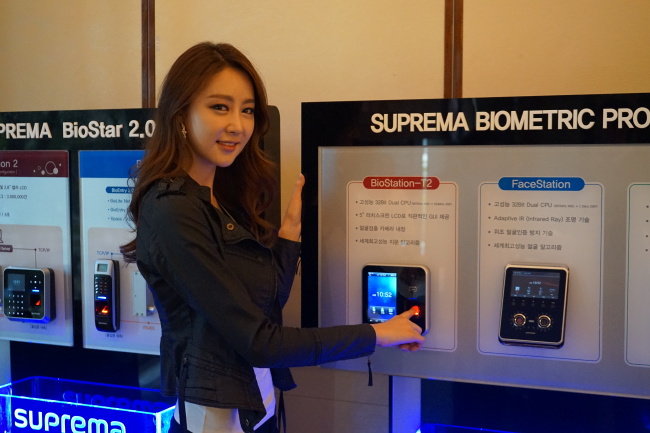South Korean biometric security system developer Suprema unveiled a next-generation fingerprint reader for access control uses, such as entry to buildings, and a new open security platform Thursday.
The biometric scanner, named BioStation 2, equipped with a 32-bit Coretex-A9 1.0 GHz CPU, boasts improved fingerprint recognition and data analysis capabilities ― the new fingerprint reader is three times faster in identification and four times more accurate than its predecessor.
Around 1 million fingerprint templates and 3 million event logs can be stored in the biometric device.
 |
| A model poses with Suprema’s new fingerprint reader BioStation2 in Seoul on Thursday. (Suprema) |
The water- and dust-resistant BioStation 2 can be installed both indoors and outdoors and supports various interfaces including TCP/IP, USB and Wiegand.
“The BioStation 2, which is the industry’s most advanced product, will become a breakthrough in the fingerprint reader market for access control” said Lee Gyu-hwan, chief of the firm’s convergence security business division, at a press meeting held in Seoul.
Also introduced at the press meeting was the Web-based open security platform, called the BioStar 2. The new security platform can be easily integrated with other biometric devices, and monitoring and alert systems. Upgrades of the software for the platform can be made online.
The security platform is also compatible with CCTV, enterprise resource planning systems and Google Maps Engine, and supports Internet browsers including Internet Explorer, Firefox and Chrome.
“A great number of applications will be developed and incorporated into Suprema’s new security platform,” predicted Lee Jae-won, chief executive of the Korean biometrics firm, adding that “the firm would make efforts to create an ecosystem for biometrics and security technology.”
He also vowed to increase the firm’s footing in the global biometrics market for mobile devices.
By Kim Young-won (wone0102@heraldcorp.com)



